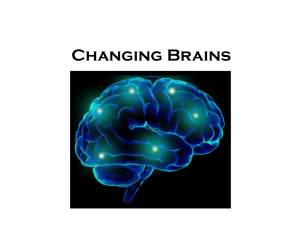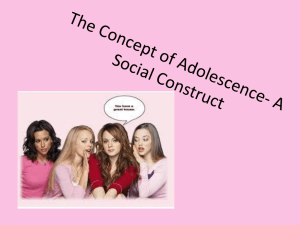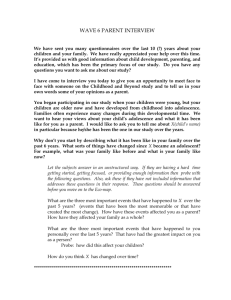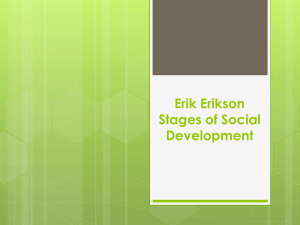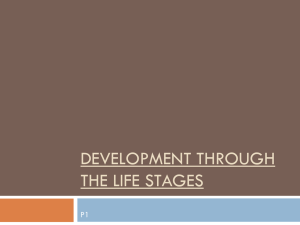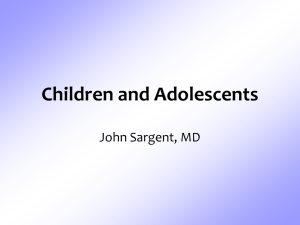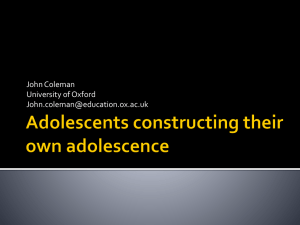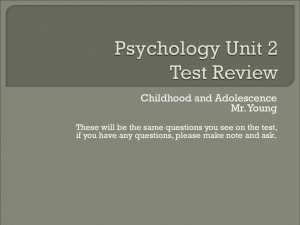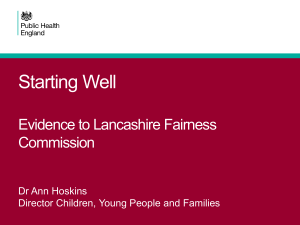Adolescence
advertisement
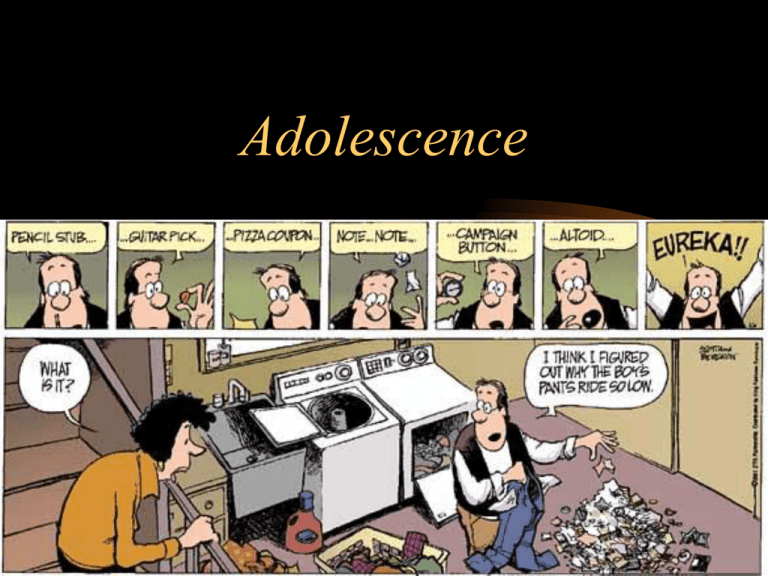
Adolescence Adolescence • The years between childhood and adulthood • Broken into 3 stages: – Early Adolescence: 10-14 – Middle Adolescence: 14-16 – Late Adolescence: 16-19 Adolescence • Marked by significant changes: – – – – – – Physical Social Emotional Psychological Cognitive—Intellectual Moral Adolescence as a Social Invention • A historically new phenomenon – G. Stanley Hall • Why? – – – – Industrialization Urbanization Education Adolescent Employment Erik Erikson • Personality (Identity) Development • A “healthy” identity is acquired through the resolution of a series of life crises/dilemmas • 8 stages in life – 2 stages in adolescence Erikson—Stage 4 • Industry – Early Adolescent – Must “do” or accomplish things – Adult role models become important • Inferiority – If NO achievements a sense of inferiority or inadequacy develops Erikson—Stage 5 • Identity vs. Role Confusion – Questions: • Who am I? • What can I be? • Am I capable? – Major influence: • Peers more important than parents – Dynamic: • Testing roles in social situations • Looking for feedback—Am I liked? Can I like? Stress and Crisis • Adolescence is a time in a teen’s life that can be very stressful. – Expectations—family, friends, parents, teachers, etc. – Causes feelings of being overwhelmed and confused • Result—Identity Crisis Identity Crisis • Definition: – Situation of emotional and mental stress requiring significant changes of outlook within a short period of time. – Includes personality changes. • Erikson— “a time of suspended animation” Identity Crisis • “Suspended Animation” • Two Poles: – Moratorium ( ) on one end – Impulsive acts/feelings on the other Role Confusion Influences • Fidelity– Search or desire for something to be TRUE to. • person, idea, etc. • Dynamic– Testing roles in social situations and looking for feedback. • Genuineness– of people, models, ideas, tendency to love/hate, right, wrong. • Intensive Reactions—or expressions— – of their fidelity, love, and hate. Variables in Identity Crises • Need– peer acceptance in early adolescence • Self-indulgence – preoccupied with appearance and looks • Unique – they think no one else has their problems • Important: – Self esteem – being “cool” • Conflict – with parents, but move on and become more independent • Fear of: – physical differences – not fitting in Results of an Identity Crisis Positive • A new self-definition is integrated into personality • The person moves on (succeeds) with life • The “Real Me” is found. Negative • Role confusion is not solved • There can be feelings of shame, lack of pride, and personal alienation. • It can eventually develop into a completely negative identity—gangs, delinquent behavior Offer • Longitudinal Study • 1975 • Identifies 3 Basic Styles of Adolescence Offer’s 3 Styles of Adolescence: • Continuous—23% • Surgent—35% • Tumultuous—21 % Offer’s 3 Styles of Adolescence: 35 30 25 20 Percent 15 10 5 0 Continuous Surgent Tumultuous Continuous •Smooth transition •Good family relations •Accept societal roles •Good interpersonal relations •“All American Kid” Example of Continuous • The Brady Bunch • Few Problems • Grew up in “All American Family” Examples of Continuous • • • • • Brady Bunch Happy Days 90210—Brandon Eric—That 70s Show Corey—Boy Meets World • The Wonder Years— Kevin • 7th Heaven Surgent •Cycle of “ups and downs” •Plateau of stability then, another crisis comes up •Generally families had divorce, major crisis or death. Example of Surgent • Dawson • Dawson’s Creek – Most of the characters can fit into one of Offer’s 3 Styles Surgent Examples • • • • Party of Five 90210—Kelly, Steve Others? Shawn—Boy Meets World Tumultuous •Inner turmoil •Behavioral problems •Critical of social environment •Very introspective and sensitive •Withdrawal Tumultuous Examples • Daria • Hyde—That 70’s Show Elkind • Imaginary audience- high selfconsciousness, all looks are critical, strong feelings of being conspicuous. • Adolescent Egocentricism- follows along with imaginary audience, they are the center of attention, either negative or positive. Imaginary Audience STURM Und DRANG?!? • Is Adolescence Sturm und Drang? • (storm and stress)
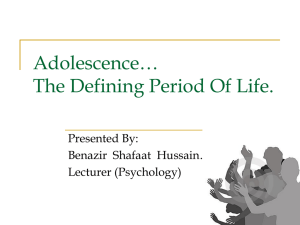
![Adolescence in 20th Century Literature and Culture [DOCX 16.08KB]](http://s3.studylib.net/store/data/006806148_1-4fb552dd69cbfa44b08b2f880802b1fe-300x300.png)

